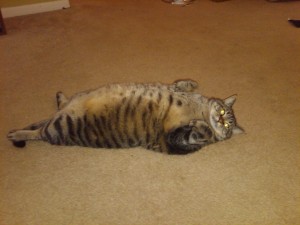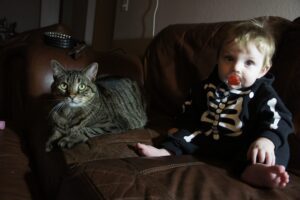Big Kat
Angel Alcorn first took in “Kat” in the fall of 2007 from a neighbor who found the cat wandering around outside for a week or so. She had no collar, and was dirty from being outside, but she needed a home. She was spayed, declawed and obviously well fed. Someone, at some point, had taken care of her. Angel writes, “Soon she was our baby. We spoiled her with yummy sounding foods and lots of treats.”
Angel continues, “Everyone would comment on how “BIG” she was, but since she was big when we found her, we assumed that was just “normal.” When we took her to her first vet visit, the doctor told us that Kat, weighing in at about 20lbs, was VERY overweight. We were told her bone structure was that of an 8 or 9 pound cat, and that her weight could cause joint problems, heart issues or other diseases. We tried getting her to play more, and even bought a kitty leash to take her for walks outside, but nothing seemed to work. If anything, she seemed to get bigger, and lazier. After over a year with no success, we took her to get a second opinion. This vet suggested switching to another diet plan. It didn’t work. Soon Kat worsened from lazy to lethargic, and she became very ill. Just when we were about to give up hope, we went to the Ann Arbor Animal Hospital.
A New Diet Plan
When Dr. Heather Jarrett at the Ann Arbor Animal Hospital first saw Kat in March 2010, she was ill and up to over 21 pounds. Angel described for Dr. Jarrett the diet plans she had so conscientiously worked on with Kat to no avail. She indicated Kat had tested negative for diabetes at a previous veterinary hospital, which was a concern of Dr. Jarrett’s.
Angel writes, “Fortunately, the doctor (Dr. Jarrett) was very knowledgeable and reassuring. She worked with us developing a plan to get Kat on the path to recovery. She taught us a lot of things we didn’t know, like portion size. On packages of cat food it tells you how much food to feed your cat based on weight. We had been basing it on Kat’s actual weight. We learned from the doctor that we should be feeding her based on her goal weight. The doctor gave us a great list of specific brands and flavors of food that have the exact right carb/protein ratio for Kat. We set her goal weight as 12 pounds.”
Dr. Jarrett says, “Cats need more protein in their diet. If they were in the wild, they would be eating mice or other small prey. Often times a canned food diet for these kitties is best because of the higher protein and lower carbohydrate levels. While feeding canned food can be smelly and messy, it often is the best thing for many cats.”
Success at Last
About 6 weeks later, Dr Jarrett examined Kat again. She had already lost over 1.5 pounds. Kat and her family were off to a great start! Dr. Jarrett confirmed what foods Kat was eating, how much, and how often. Kat’s family was encouraged to continue with the plan and weigh her once a month to check progress.
From Lazy Blimp to Mountain Lion!
Angel continues, “I am happy to report that just over a year later, Kat weighs about 14 pounds and is healthier and has more energy than ever. It is not unusual to get pounced in the middle of the night by our little ‘mountain lion’ as we now call her. She has scaled the top of the fridge and somehow gotten into the upper cabinets. We might have our hands a little more full, but we couldn’t be happier. Her face has a lot more definition and she actually has a waist! People who come over can’t believe how great she looks. Everyone says ‘Wow! She looks like a normal cat!’ Instead of rewarding her with treats, we now reward her with toys.”
According to Angel, another favorite activity of the newly-thin and active Kat is playing nanny to her 8-month-old son, Cassius. “Previously terrified of the vacuum, Kat will now run between it and the baby, arching her back and hissing. Don’t mess with the mountain lion!”
If you feel that your pet may be overweight, please contact your veterinarian for help with a proper feeding and exercise plan.
Recent Posts
About Us
Ann Arbor Animal Hospital is a locally-owned animal hospital operating for over 90 years in Ann Arbor, MI.


